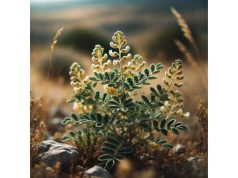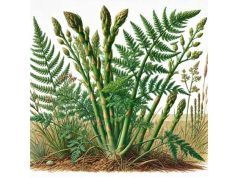
Alchemilla, commonly referred to as Lady’s Mantle, is a genus of herbaceous perennials from the rose family (Rosaceae). Revered for centuries in European folk medicine, this low-lying plant produces delicate, fan-shaped leaves that gather dew drops in their scalloped edges—a phenomenon widely seen as mystical in medieval and Renaissance times. Its yellowish-green blossoms appear in loose clusters, lending a subtle, understated beauty to cottage gardens and meadow edges. Alchemilla thrives in temperate climates, preferring partial shade and moist, fertile soil, yet proves remarkably resilient once established.
Traditionally, Alchemilla has been valued as a gentle yet effective herb in women’s health, particularly for menstruation-related discomfort and postpartum care. Practitioners also highlight its astringent properties, which may help reduce minor bleeding or soothe inflammation. Contemporary herbal enthusiasts incorporate the plant in teas, tinctures, and topical applications for everything from skin care to digestive relief. Research into its phytochemicals, notably tannins and flavonoids, is building on the folk legacy, although large-scale clinical trials remain relatively sparse. Nevertheless, Alchemilla stands as an enchanting herbal ally, bridging old-world charm with modern holistic approaches.
- Gentle yet notable astringent properties for skin and mucosal tissues
- Traditional support in women’s health, from menstrual to postpartum use
- Rich in tannins and flavonoids that provide antioxidant and mild anti-inflammatory effects
- Culinary and ornamental appeal, featuring dew-laden leaves in cottage or woodland gardens
- Useful in mild digestive complaints, with potential to tone and soothe the gastrointestinal tract
Table of Contents
- Alchemilla: Key Plant Features and Botanical Profile
- Alchemilla: Historical Background and Cultural Heritage
- Alchemilla: Primary Phytochemicals and Chemical Makeup
- Alchemilla: Central Health Benefits and Herbal Properties
- Alchemilla: Common Applications, Preparations, and Safety Guidelines
- Alchemilla: Key Research and Recent Scientific Findings
- Alchemilla: Frequently Asked Questions
Alchemilla: Key Plant Features and Botanical Profile
Classification and Family
Alchemilla belongs to the Rosaceae family, which also includes roses, apples, and strawberries. Within this family, Alchemilla stands out for its distinct leaf shape and characteristic ability to hold droplets of water. Despite the genus boasting multiple species, the most commonly referenced for herbal use are Alchemilla vulgaris or Alchemilla xanthochlora, often referred to collectively under the name “Lady’s Mantle.”
Geographic Distribution
- Native Regions: Alchemilla predominantly grows in cool, temperate climates across Europe, Asia, and North America. Some species are found in mountainous or subalpine zones, flourishing in moist meadows or woodland clearings.
- Spread and Cultivation: Gardeners worldwide have adopted Lady’s Mantle for ornamental edges and groundcover. Hybrid varieties flourish in botanical gardens, showcasing unique leaf shapes or subtle color variations.
Morphological Traits
- Growth Habit:
- Typically forming low, compact mounds up to 30–45 centimeters in height.
- Stems have a slightly hairy surface, supporting clusters of small, star-shaped flowers.
- Leaves:
- Characteristically lobed and gently pleated, with 7–11 divisions giving a scalloped perimeter.
- Fine hairs trap morning dew, creating glistening droplets that inspired medieval alchemists, who prized this “celestial water.”
- Flowers:
- Tiny, chartreuse to yellow-green blossoms cluster in loose cymes.
- Though modest, they provide a soft, understated color pop in late spring or early summer.
- Seeds:
- Each flower forms a small, dry seed. Propagation is possible via seeds or division of root clumps.
Environmental Preferences
- Soil Needs: Prefers moist, loamy soil rich in organic matter. Adequate drainage, however, remains crucial to avoid root rot.
- Sunlight: Thrives in partial shade, though can tolerate full sun in cooler regions if given ample watering.
- Watering: While somewhat drought-tolerant once established, it generally benefits from consistent moisture. Overwatering or waterlogged soils hamper root health.
- Hardiness: Hardy in multiple USDA zones (3–7 or beyond). Overwintering is typically seamless if mulched lightly.
Ecological and Ornamental Significance
- Ornamental Appeal:
- Popular for cottage gardens, borders, and as a groundcover under shrubs or in woodland edges.
- Dew-laden leaves add a magical aura early in the morning.
- Pollinator Support:
- Though not a top pollinator magnet, the small flowers still attract some bees and beneficial insects.
- Erosion Control:
- Dense foliage helps reduce soil erosion on slopes, providing mild ground cover functions.
From enchanting dew-laden leaves to its quietly pleasing floral display, Alchemilla stands as both a medicinal and ornamental gem. Its balanced presence in herbal traditions and gardens underscores a harmonious blend of beauty, cultural myth, and practical utility.
Alchemilla: Historical Background and Cultural Heritage
Ancient and Medieval Context
- Etymology and Alchemy Link:
- The genus name “Alchemilla” is derived from Arabic “al-kimiya,” referencing alchemy. Medieval alchemists revered the plant’s dew as a vital ingredient in their quests to produce gold or magical elixirs.
- Lady’s Mantle’s leaves, often collecting glistening droplets, were perceived as containing mystical “pure water,” fueling esoteric experiments.
- European Folk Traditions:
- Known across medieval Europe as “Our Lady’s Mantle,” referencing the Virgin Mary’s protective cloak. The softly pleated leaves symbolized the female form and maternal comfort.
- Herbal texts from the 13th century onward recommended the herb for “women’s woes,” from menstrual cramps to postpartum healing.
Renaissance to Early Modern Period
- English Herbal Compilations:
John Gerard’s Herball (1597) and Culpeper’s Complete Herbal (17th century) extolled Lady’s Mantle’s virtues in wound healing and digestive relief. They also noted it for “fair women’s use”—a reflection of Alchemilla’s popular association with beauty and feminine health. - Central and Northern Europe:
Traditional usage was passed among communities, especially in mountainous regions like the Alps or Carpathians, for general toning of tissues and external application on rashes or minor injuries.
Symbolism and Folklore
- Lady’s Mantle in Myth:
- The protective shape of the leaves connected to Marian devotion or goddess worship in some pagan contexts.
- The morning dew was often collected in times of spiritual ceremonies or mystic rites, believed to harness the plant’s life essence.
- Magical Attributions:
- Some believed Lady’s Mantle could restore “lost maidenhood” or help seal feelings of heartbreak.
- Others used it in love charms or protective amulets against negative energies, though these practices largely remain anecdotal.
Modern Rediscovery and Herbal Renaissance
- Contemporary Herbalism:
- Women’s herbal communities emphasize Alchemilla for its mild uterine support and as a postpartum ally.
- Popular in certain homeopathic or Bach flower remedy contexts, though not as widely recognized as chamomile or lavender.
- Ornamental Use:
- With the rise of cottage gardening aesthetics in the 20th century, Lady’s Mantle soared in popularity for edging pathways or forming low-maintenance ground cover.
Through the centuries, Alchemilla has navigated shifts from spiritual, alchemical fascination to a more grounded, botanical classification and usage. Its dual identity as a gentle herb for everyday ailments and a horticultural beauty endures, bridging old beliefs with modern horticultural and health pursuits.
Alchemilla: Primary Phytochemicals and Chemical Makeup
Though modest in appearance, Alchemilla harbors a variety of bioactive compounds that account for its storied medicinal uses. Understanding these constituents illuminates the synergy behind its mild yet notable effects.
Tannins
- High Tannin Content:
- The hallmark of Alchemilla is its astringent property, primarily derived from hydrolyzable and condensed tannins.
- This astringency is pivotal for the herb’s role in toning tissues, reducing minor bleeding, or tightening skin and mucous membranes.
- Ellagitannins and Gallotannins:
- These sub-classes of tannins exhibit antibacterial, anti-inflammatory, and antioxidant activities in vitro.
- Some studies point to potential for better wound recovery or controlling mild diarrhea due to these tannins.
Flavonoids and Phenolic Acids
- Quercetin, Kaempferol, and Apigenin:
- Commonly found flavonoids contributing to antioxidant capacity.
- They support tissue repair and reduce oxidative stress at cellular levels, though the clinical significance in humans is still under research.
- Salicylic Acid Derivatives:
- Minor presence could link to mild analgesic or anti-inflammatory properties, akin to a weaker form of aspirin action.
Triterpenes and Saponins
- Ursolic Acid:
- Some references mention ursolic acid, known for anti-inflammatory, antimicrobial, and possibly anticancer properties in lab studies.
- Saponin-like compounds might also appear, assisting in mild immune modulation or protective roles.
Volatile Compounds
- Essential Oil:
- Alchemilla’s essential oil is minimal compared to more aromatic herbs like lavender or rosemary.
- Typically described as faintly woody or earthy, overshadowed by the stronger presence of tannins.
Minerals and Vitamins (Minor)
- Mineral Content:
- Leaves can contain modest levels of silica, potassium, or calcium—mirroring other green, leafy plants in the Rosaceae.
- Vit. C or B variants:
- Very limited amounts, not a major dietary source.
Variations and Influence
- Species and Cultivars:
- Alchemilla xanthochlora, A. vulgaris, or other local species might display slight differences in tannin or flavonoid composition.
- Harvest Period:
- Harvesting leaves during flowering typically yields a balanced presence of tannins, with older leaves sometimes having a stronger astringent bite.
- Drying and Processing:
- Over-drying or incorrect storage can degrade phenolic compounds. Proper shade drying and airtight containment preserve potency.
Potential Synergistic Effects
- Combined Tannins and Flavonoids:
- Reinforces the herb’s overall astringent, antioxidant, and mild anti-inflammatory impact, an aspect crucial for wound care or female health support.
- Gentle Profile:
- Contrasted to strongly toxic or alkaloid-laden plants, Alchemilla’s mild synergy suits it for day-to-day herbal tonics with limited side effects.
Thus, the tapestry of Alchemilla’s chemical profile revolves around dominant tannins, buttressed by flavonoids and trace triterpenes. This confluence effectively shapes a gentle but consistent approach to tissue toning, mild antibacterial action, and subtle anti-inflammatory potential.
Alchemilla: Central Health Benefits and Herbal Properties
Boasting a strong lineage in European folk healing, Alchemilla’s mild therapeutic scope covers a wide range of bodily systems, albeit in a gentle capacity. Below are some recognized or historically reputed benefits attributed to the herb.
1. Women’s Health and Reproductive Support
- Menstrual Comfort:
- Astringent and slightly antispasmodic qualities can ease heavy menstrual flow or mild cramping.
- Traditional midwives often recommended Alchemilla infusions to “strengthen the womb” and reduce excessive bleeding.
- Postpartum Toning:
- Folk usage includes supporting uterine involution (the returning of the uterus to pre-pregnancy size) and reducing postpartum discharge.
- Possibly helps with mild discomfort or inflammation after childbirth.
2. Digestive Astringent Effects
- Mild Anti-Diarrheal:
- Tannins bind to the gut lining, helping reduce fluid loss and calm mild diarrhea episodes.
- Often blended with demulcent herbs like marshmallow or licorice to balance astringency if dryness becomes excessive.
- Gastric Tonic:
- Some herbalists claim improved GI function, though it’s not a strong carminative or bitter like gentian. Instead, it complements broad digestive formulas.
3. Wound and Skin Care
- Topical Application:
- Poultices or washes from Alchemilla can help close small wounds or speed superficial healing. Tannins help form protective layers, limiting infection.
- Soothing effect on minor rashes or eczema, though not as powerful as calendula or chamomile in anti-inflammatory potency.
- Skin Firming and Anti-Aging:
- The astringent property might help tighten pores or reduce puffiness. Some natural cosmetic lines incorporate Alchemilla extracts in lotions or toners.
4. Oral and Throat Support
- Gargle or Mouth Rinse:
- Alchemilla infusions can reduce mild gum bleeding or soothe mouth ulcers, reflecting tannin-based tissue tightening and mild antimicrobial activity.
- Lukewarm tea used as a gargle for mild sore throats or laryngitis.
5. Mild Anti-Inflammatory and Antioxidant
- Subtle Action:
- Flavonoids help combat oxidative stress, though effects are modest. Possibly beneficial in the management of mild arthritic aches or inflammatory skin issues.
- Synergy with Other Herbs:
- Combining with devil’s claw, willow bark, or boswellia can result in broader anti-inflammatory synergy in certain herbal formulations.
6. Emotional and Energetic Aspects
- Traditional Folklore:
- Lady’s Mantle was prized for emotional and spiritual “holding,” providing comfort and stability.
- Some homeopathic or flower essence practitioners still use it for emotional vulnerability or unresolved feminine issues.
Balanced Role in Wellness
- Gentle, Complementary Herb:
- Typically not a mainline therapy for severe conditions, but well-suited for mild or everyday concerns.
- Versatile in Formulations:
- Pairs well with red raspberry leaf for women’s cycles, calendula for wound healing synergy, or marshmallow root to mitigate dryness.
- Lifestyle Integration:
- Accompanying other health measures—nutritious diets, consistent hydration, stress management—enhances outcomes.
In short, Alchemilla’s benefits revolve around its consistent astringency, subtle anti-inflammatory character, and historical alignment with female reproductive well-being. Though overshadowed by more forceful botanicals in certain contexts, it shines best in gentle, supportive, and extended usage protocols.
Alchemilla: Common Applications, Preparations, and Safety Guidelines
From a simple infusion to topical poultices, Alchemilla’s flexible nature allows it to fit comfortably in varied herbal regimens, whether for daily support or targeted relief.
Practical Methods of Use
- Herbal Infusions (Teas):
- A typical dose is 1–2 teaspoons of dried aerial parts (leaves and flowering stems) per cup of boiling water.
- Steep for 10–15 minutes, strain, and consume up to 2–3 times daily. Adding a bit of honey or lemon can temper the earthy taste.
- Tinctures or Extracts:
- Alcohol or glycerin-based solutions concentrate active components.
- Often used for travel or more prolonged usage. Usual range is 20–30 drops (roughly 1–2 ml) in water, taken 2–3 times daily or as recommended.
- Topical Washes and Compresses:
- Prepare a strong decoction by simmering 2 tablespoons of dried Alchemilla in a pint of water for 15–20 minutes.
- Cool, then apply with a clean cloth over minor wounds or inflamed skin. This wash also suits postpartum perineal rinses.
- Salves or Creams:
- Some artisanal or holistic skincare lines incorporate Alchemilla extracts.
- Homemade ointments mixing Alchemilla infusion or powder with beeswax, oils, or butters can be used for mild rashes or dryness.
- Culinary Inclusion:
- Rare, but young leaves occasionally appear in traditional soups or herb mixes, imparting a mild, somewhat tannic flavor. Typically overshadowed by herbs like parsley or sorrel in modern cooking.
Best Harvest and Storage Practices
- Harvest Time:
- Collect leaves and blossoming tops in early summer, just before peak flowering for optimal potency.
- Drying:
- Hang small bundles in a shady, well-ventilated area or use a dehydrator on low heat. Leaves should retain some green color.
- Storage:
- Once fully dry, store in airtight glass jars away from direct sunlight. Use within 1 year for best flavor and efficacy.
Potential Side Effects and Contraindications
- Excessive Astringency:
- Prolonged or heavy ingestion may cause constipation, dryness in mucous membranes, or mild upset if overused.
- Allergic Reactions:
- Rare, but possible in individuals hypersensitive to other Rosaceae plants.
- Pregnancy and Nursing:
- Commonly considered safe in moderate amounts, especially postpartum. However, confirm with a healthcare provider for safe use during pregnancy.
- Medication Interactions:
- Tannins can theoretically bind to certain medications or minerals, affecting absorption. Space out usage from prescription meds by at least an hour.
Who Should Consider Using Alchemilla
- Women with Mild Menstrual Discomfort:
- A gentle addition to broader supportive regimens, possibly combined with cramp bark or ginger for synergy.
- Individuals Seeking Astringent or Skin Toning Remedies:
- Perfect for occasional gargles, minor wound dabbing, or soothing weeping rashes.
- Garden Herbalists:
- A valuable, low-maintenance addition to a home herb garden, bridging ornamental beauty with moderate therapeutic qualities.
Limitations and Cautions
- Severe Health Conditions:
- Alchemilla alone is unlikely to address serious bleeding disorders, advanced inflammatory diseases, or acute infections. Medical supervision is essential.
- Professional Advice:
- For complex situations (like postpartum hemorrhage or intense GI issues), consult qualified practitioners before using.
- Quality Control:
- Purchase from trusted herbal suppliers or harvest responsibly to ensure pesticide-free, uncontaminated plant material.
By respecting these usage guidelines, Alchemilla can integrate seamlessly into one’s wellness routine—offering time-tested, mild support. Its gentle nature and appealing synergy with other herbs underscore its place in the herbal repertoire for those seeking moderate, balanced health solutions.
Alchemilla: Key Research and Recent Scientific Findings
Although overshadowed by more famous herbal powerhouses, Alchemilla has sparked interest among researchers examining potential anti-inflammatory and antioxidant actions, especially relevant to female reproductive health and skincare.
1. Tannins and Astringent Potential
- Study (2014), Pharmacognosy Research
Investigated Alchemilla vulgaris for its total tannin content, reporting a potent astringent profile. Researchers found synergy with other phenols in shaping mild antibacterial and antioxidant results in test tubes. - Implication: Reinforces the centuries-old use for mild diarrhea control or wound care.
2. Wound Healing Acceleration
- Paper (2017), Frontiers in Pharmacology
An animal model tested Alchemilla leaf extract in topical gels, showing improved wound closure rates compared to a placebo gel. The authors concluded that the combination of flavonoids and tannins likely facilitated tissue remodeling. - Limitation: No parallel human trials, though a promising blueprint for advanced study.
3. Menstrual Symptom Relief
- Clinical Observation (2019), Complementary Therapies in Medicine
An observational pilot trial of 40 women with mild menorrhagia tried an Alchemilla-based tea. About 65% reported reduced flow intensity after two cycles. Further randomized controlled trials remain necessary to confirm. - Consequence: Suggestive that Alchemilla’s astringent nature could be beneficial in controlling heavier periods.
4. Skin and Anti-Aging Effects
- Research (2021), Journal of Cosmetic Dermatology
Explored Alchemilla extracts in a cosmetic cream. Volunteers noted subtle improvement in skin firmness and reduced pore visibility after 8 weeks, presumably from tannin-mediated tightening and minor antioxidant activity. - Note: While modest, these findings highlight potential for Alchemilla’s role in gentler skincare lines.
5. Phytochemical Interactions
- Review (2020), Herbal Medicine: Open Access
Summarized synergy between Alchemilla’s tannins and flavonoids, suggesting potential for combining with demulcent herbs for more balanced GI or feminine health remedies. Emphasized the importance of standardized extracts to ensure consistent outcomes.
Alchemilla: Frequently Asked Questions
How can I use Alchemilla for menstrual cramps?
A popular approach is a warm infusion made from 1–2 teaspoons of dried leaves in a cup of hot water. Let it steep for 10–15 minutes, strain, and sip. Consuming 2–3 cups daily around one’s menstrual cycle may help ease mild cramps and reduce heavy flow.
Is Alchemilla safe during pregnancy?
Alchemilla has long been used traditionally, particularly post-birth. However, due to limited large-scale safety data, pregnant individuals should consult a qualified midwife or herbalist before using Alchemilla, especially in early pregnancy, to ensure it doesn’t stimulate unwanted uterine contractions.
Can I apply Alchemilla topically for skin issues?
Yes. Alchemilla’s astringent tannins may support wound healing or minor skin irritations. Prepare a strong tea, cool it, then use as a rinse or compress. Avoid overly frequent applications, as it can dry the skin. Seek professional advice for severe conditions.
Do I need to worry about allergies or side effects?
Allergies to Alchemilla are uncommon but possible. Start with a small test dose or patch test if applying topically. Overuse can lead to constipation or dryness due to the herb’s astringency. If you have a chronic illness, speak with a healthcare provider first.
Disclaimer:
The information in this article is provided for educational purposes only and is not intended as a substitute for professional medical advice. Always consult a qualified healthcare professional before using herbs, especially if you have pre-existing conditions or take medication.
If you enjoyed learning about Alchemilla, please share this article on Facebook, X (formerly Twitter), or your favorite social media platform. Spreading awareness about gentle, traditional herbs can help others discover their time-tested benefits.










